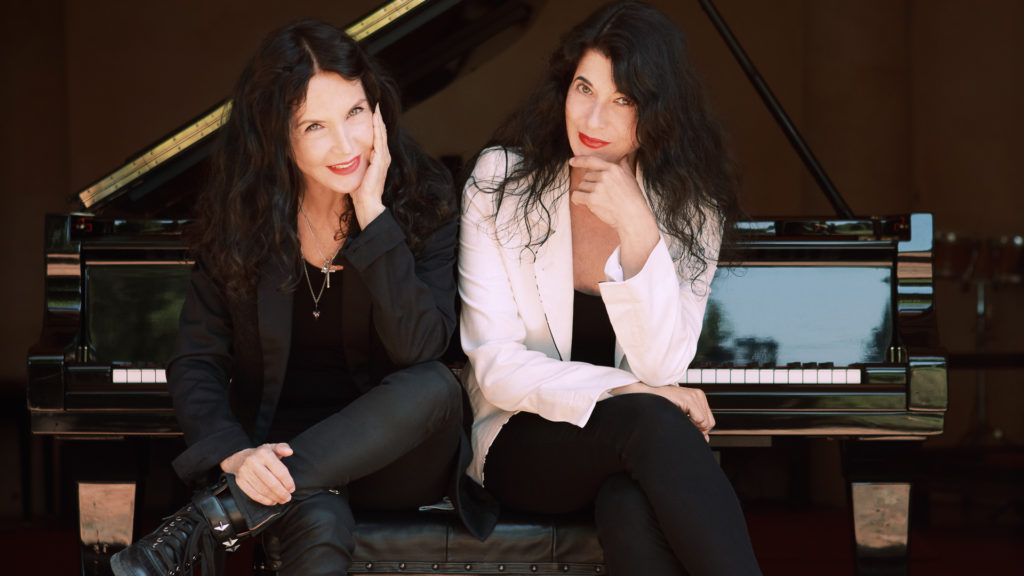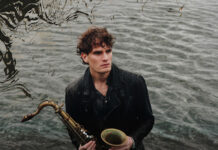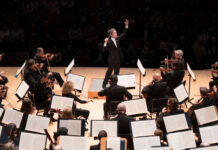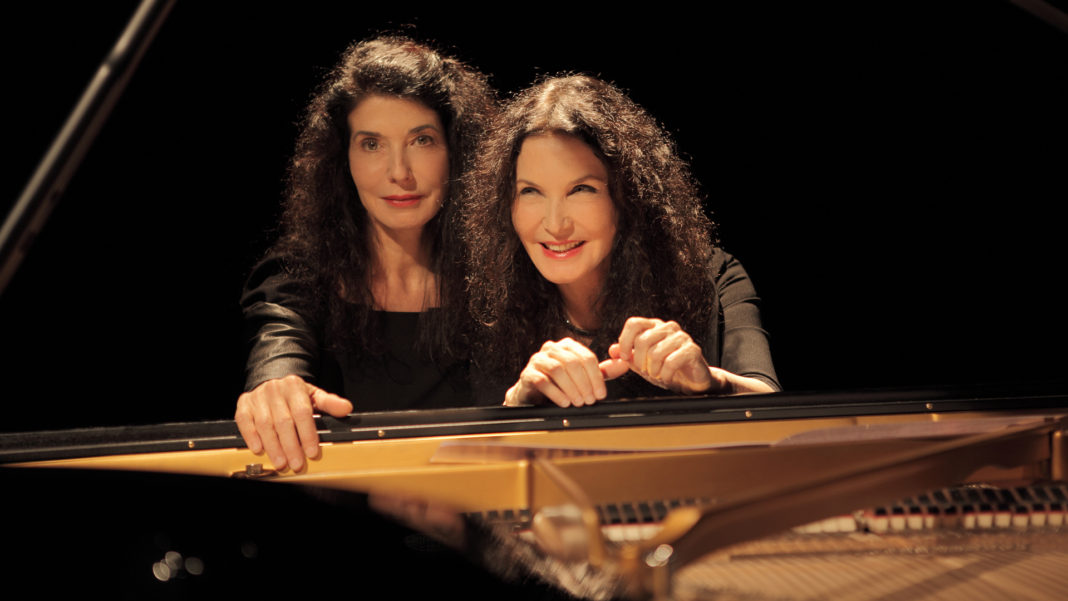If you enjoyed a single piece of music, how far would you travel to hear it? Imagine enjoying that piece of music so much that you would fly eleven-and-a-half hours for the opportunity to hear it. That isn’t quite the same equation for pianists Katia & Marielle Labéque. They aren’t traveling all the way from France to Los Angeles to hear Saint-Saëns’s Carnival of the Animals. Rather, they are flying here to play this 27-minute work at the Hollywood Bowl on Tuesday night.
The Labéque Sisters have been playing music for two pianos together for nearly 50 years. Their first recording was of Olivier Messiaen’s Vision De L’Amen in 1970. But it was a Gershwin recording in 1980 that firmly established their career by becoming one of the first Gold Records in Classical Music.
Carnival of the Animals was written as a celebration of Mardi Gras by the composer in 1886. However, he did not allow the work to be published until after his death in 1922. It’s a work commonly associated with children as it uses music to depict various animals. In the process it showcases various instruments in the orchestra. Ogden Nash wrote text for the piece. At Tuesday night’s performance, Sean Hayes (Will & Grace) will serve as the narrator.
Last week I spoke with Marielle and Katia about this work, their recent collaboration with Thom Yorke of Radiohead and why they wanted to travel all this way to play at the Bowl.
Your schedule only shows one concert upcoming and that is this one performance of Carnival of the Animals. What makes that so special for you that it would be worth your time and energy to fly all the way to Los Angeles to perform a 27-minute piece?
Marielle: It is a bit crazy. First of all because I love this piece and it such a wonderful experience to play the Hollywood Bowl. We love the place and the atmosphere. Also we come to Los Angeles quite often and it also a pleasure to be back. This is the first place we came in America.
Katia: It’s all our friends. It’s like a family. They know us and we’ve been doing so many things for them and it’s exciting. In one concert you can perform for as many people as in seven or eight recitals. It’s not a lot of pressure to do that. It’s pure pleasure.
For those who think Saint-Saëns wrote this piece mostly as a work for children, what would you tell them?
Marielle: Of course there is more to it. He wanted to do it with friends at his home and it became such a popular piece. Aquarium is played every year at the Cannes Film Festival. The Swan is so beautiful. I remember we did Carnival with Leonard Slatkin and the adults were laughing so much more than the children.
Why do you think Saint-Saëns did not want the work published until after his death?
Katia: I am thinking of that every time I play it. I think that’s ironic that this is probably his most famous piece and he didn’t want it published. He was afraid of the people he was mocking – like the donkeys for the music critics. The pianist is also mocking the pianist. We are supposed to play it as if we don’t know how to play. We don’t rehearse it. We don’t fake it, but we try to think of how do we do it if we don’t know how to play.

Composer Bryce Dessner told me that it was a joy to make music with you and that you work harder and that “they can play three notes and it can be just the most beautiful – you make music immediately.” How much work does it take to get to the point where a composer would say that about you?
Katia: It takes certainly a lot of work, but it’s only with this amount of work that you can make it natural. I remember Fred Astaire was asked all the time, “How did you get to dance so naturally.” He said, “I rehearse each movement 5,000 times. And then I can do it easily.” I always have this in mind. That’s the only way to do it.
Marielle: We fight for each note, it is true. We are like that, Katia and I, because we are hard workers. I was so happy when we played for him. We had this energy and desire, of course. If you don’t like the music you play you can’t give pleasure to anyone or the audience. Modern music we love it.
[Earlier this year Dessner released El Chan, which is a concerto who wrote specifically for the Labéque Sisters.]
In addition to working with Dessner, you’ve recently been working with Thom Yorke of Radiohead. What has that experience been like for you?
Marielle: I’m a fan of Radiohead because I really love this group, but Katia this was always her dream. She met him and asked him to write the music which isn’t easy. We worked also like crazy because it was a completely different language than everything we did before. It was two piano and one piece of electronics.
Katia: Oh he’s a genius! He’s an amazing musician. We’ve been admiring his music since so many years. Radiohead is one of my favorite groups. It’s one of the rare groups that plays manages to produce interesting stuff. Thom was afraid. He said, “I don’t know how to write music.” But he sent .wav files and it was transcribed. From there we started to build up what we imagined of his music. What’s really interesting with Thom is he thinks about atmosphere and mystery and it’s really good for us to work with a musician like that.
You are now fast-approaching fifty years since your debut. When you imagined your career, is the path you’ve taken so far the career you had hoped for?
Katia: We never imagined that. We had the idea it could be nice, but we never imagined this. Life is always a surprise.
Marielle: Of course we wanted to be together and play together. But it’s still a surprise to for us. It’s a joy to make music. I treasure each moment we have even more than when I was 20 years old. We work a lot but we have something between us like that for so many years. It’s amazing.
Katia: Our only ambition was just to stay together. We did not have this pressure on us when we started. We could concentrate on the music. Today I see a lot of young pianists and they are concerned about the image and things. But when do they practice? We had a very natural way to meet with people and to work and that was good. But you know at the time we started nobody wanted to hear piano duets. It was not very modern. In Europe really we did not have so many duets. Now it is great and we have a lot of [new] works and it’s good for us. We were kind of a model. We are proud of that.
In addition to Carnival of the Animals, the Los Angeles Philharmonic will perform Berlioz’s Symphonie Fantastique. Juanjo Mena conducts. For tickets go here.
Photos by Umberto Nicoletti/Courtesy of labeque.com











